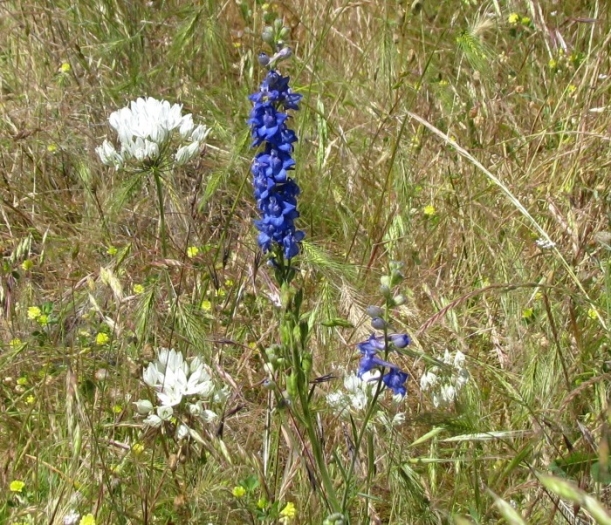Twospike Larkspur
(Delphinium distichum)
Twospike Larkspur (Delphinium distichum)
/
/

66dodge
CC BY 4.0
Image By:
66dodge
Recorded By:
Copyright:
CC BY 4.0
Copyright Notice:
Photo by: 66dodge | License Type: CC BY 4.0 | License URL: http://creativecommons.org/licenses/by/4.0/ | Rights Holder: 66dodge | Publisher: iNaturalist | Date Created: 2014-06-04T15:40:04-07:00 |

Estimated Native Range
Summary
Delphinium distichum, commonly known as Twospike Larkspur, Two-Row Larkspur, Meadow Larkspur, Strict Larkspur, or Northern Larkspur, is a perennial herb that is native to North America, but more specifically to moist meadows, grassy slopes, and open woodlands. It exhibits a moderate growth rate, reaching heights of 1-3 feet (0.3-0.9 meters) and a spread of 0.5-1 feet (0.2-0.3 meters). This species is characterized by its upright form and deeply lobed leaves. The flowers, which are showy, range from blue to purple and are borne on tall spikes, blooming profusely in late spring to early summer.
Delphinium distichum is valued for its vertical accent and vibrant floral display, making it a popular choice for cottage gardens, perennial borders, and wildflower meadows. It is also used to attract pollinators such as butterflies and hummingbirds. While it thrives in full sun to part shade, it requires consistently moist, well-drained soils rich in organic matter, preferably with a neutral to slightly acidic pH. It is not drought-tolerant and may require staking in windy areas to prevent stem breakage. There are no widely recognized cultivars of this species, but it is important to note that all parts of the plant are toxic if ingested. Delphiniums can be susceptible to fungal diseases, particularly in humid conditions, and may be affected by pests such as aphids and mites.CC BY-SA 4.0
Delphinium distichum is valued for its vertical accent and vibrant floral display, making it a popular choice for cottage gardens, perennial borders, and wildflower meadows. It is also used to attract pollinators such as butterflies and hummingbirds. While it thrives in full sun to part shade, it requires consistently moist, well-drained soils rich in organic matter, preferably with a neutral to slightly acidic pH. It is not drought-tolerant and may require staking in windy areas to prevent stem breakage. There are no widely recognized cultivars of this species, but it is important to note that all parts of the plant are toxic if ingested. Delphiniums can be susceptible to fungal diseases, particularly in humid conditions, and may be affected by pests such as aphids and mites.CC BY-SA 4.0
Plant Description
- Plant Type: Herb
- Height: 1-3 feet
- Width: 0.5-1 feet
- Growth Rate: Moderate
- Flower Color: Blue, Purple, White
- Flowering Season: Spring, Summer
- Leaf Retention: Deciduous
Growth Requirements
- Sun: Full Sun, Part Shade
- Water: Medium
- Drainage: Medium
Common Uses
Border Plant, Butterfly Garden, Low Maintenance, Water Garden
Natural Habitat
Native to moist meadows, grassy slopes, and open woodlands in North America
Other Names
Common Names: Two-Row Larkspur, Meadow Larkspur, Strict Larkspur, Northern Larkspur
Scientific Names: , Delphinium distichum, Delphinastrum distichum, Delphinium azureum subsp. distichum, Delphinium azureum subsp. simplex, Delphinium azureum var. simplex, Delphinium burkei subsp. distichiflorum, Delphinium burkei var. distichiflorum, Delphinium distichum, Delphinium diversicolor
GBIF Accepted Name: